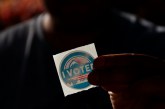 The Davis Enterprise yesterday came out in favor of Measure Q. This is not a really surprising development, and as I pointed out on Saturday, we can certainly make a case for it. However, the Davis Enterprise’s argument in its favor is completely inaccurate and misses the mark.
The Davis Enterprise yesterday came out in favor of Measure Q. This is not a really surprising development, and as I pointed out on Saturday, we can certainly make a case for it. However, the Davis Enterprise’s argument in its favor is completely inaccurate and misses the mark.
We can certainly make an argument that the city budget has been encumbered by the combination of increasing employee compensation at an unsustainable rate while at the same time accruing long-term liabilities that have been unfunded and unchecked. At the same time the city is removing $3 million from the city’s limited revenue stream, which is a move that is not going to put it on better footing.
That argument I can at least understand, even if I am not ready to endorse it. The Davis Enterprise argument is difficult to stomach not to mention inaccurate.
Writes the Enterprise:
“OPPONENTS OF Measure Q argue that City Council members and city staff need to do a better job of handling our money, running our programs and protecting residents. They use a “no” vote on Q as punishment for personnel or elected officials whom they want held accountable. Some critics see the tax as a burden on low-income residents.
We see it quite differently.
Recent economic conditions have forced cities to become creative in their approaches to paying the bills. It is fortunate that, despite the frequent dramas played out on the Davis City Council dais, our city is well-managed.
While other cities wrestle with multi-million dollar budget gaps, Davis’ is a relatively modest $1 million for 2010-11. Thanks to some painful cuts and lots of belt-tightening, we’ve retained a healthy general fund reserve of about $5 million.
That money is the city’s storm cellar. We hope we never have to use it, but it is reassuring knowing it’s there. If we don’t renew Measure Q, that reserve money could be gone in less than two years — or more program and employee cuts loom, which might be the case regardless.”
The first problem is that the city has not been well-managed at all. We are fortunate that we have not been hit as hard as other communities. That has to do with the relatively tight real estate market, the fact that this community is upper-middle class and has only recently been hit by the problems affecting other areas. We haven’t had huge waves of foreclosure, and only with state furloughs and layoffs and now university furloughs and layoffs have we felt what much of the rest of the state has felt much harder, much sooner.
But we are not well-managed. During the last decade, we have exploded our commitments to city employees and we have yet to feel the full brunt of those impacts.
Davis does have a modest budget gap which we have closed mainly through retirements and closing vacant positions, mixed in with a small amount of savings from new bargaining agreements and the cutback of a lot of city services.
However, we also face much larger problems in the impact of PERS cost hikes and an unfunded liability that is approaching $60 million. These two factors alone may siphon off as much as $11 million in additional money from the general fund within five years. Given that number is nearly one-third of our current operating budget, that is something that we should fear. And yet, not only did we irresponsibly pass policies in the last decade to create the problem, our latest round of employee bargaining has hardly touched them.
The editorial harps on the reserve as though that were some sort of saving grace. The reality is that the money in that reserve is little more than margin for error. A real crisis would wipe out that money almost instantaneously.
Think about this, that reserve is less than one-tenth of our unfunded health care liability, it is less than our pension liability, it is less than the expected PERS rate hikes, it is less than half of our unfunded needs, it is nearly half of our street repair liability. In other words, is nothing more than a buffer on an annual basis if our revenues do not reach what is projected, as they did not last year, or if we end up with additional costs or less savings than projected, as also happened last year.
And so we have dipped into our reserve this year and will cut more from the budget next year in order to repay it. That may be an appropriate use of the reserve, but to suggest is helps us plan for a rainy day and that we hope we never have to use it – we already did use it and it provides us with nothing more than a false assurance, because $5 million is nothing.
That is the reality that Davis faces and it is a bleak reality hidden behind rosy projections and rhetoric from the city manager and the finance director. The truth is that while the city has begun to address – a little – these serious problems it is really is too little and too late. We have already started to see other cities talking about declaring bankruptcy, Davis is not all that far behind those other cities.
Reuters had an article that “Bankruptcy talks spreads among California Municipal Officials.” Officials in our favorite town of Antioch are already talking bankruptcy. But they are not alone. They write, “Orange County Treasurer Chriss Street would not be surprised if more local governments across the Golden State sound a similar alarm.” Quoting Mr. Street, “There’s no such thing as entertaining bankruptcy; there’s ending denial.”
That is exactly right. In a way, we are still in denial even though it seems that the council candidates, or at least four of them, really get it in terms of the impact of employee compensation. It seems that at least four candidates get the impact that 71% of our general fund budget has on our overall fiscal picture. In the next five years, we are going to need to find ways to reduce those liabilities, because otherwise we will not survive.
There is no great way to increase revenue right now, or maybe ever. Think about it this way. Target is projected to net the city $600,000 in tax revenue. Many would dispute that number since a lot of those sales may come at the expense of other sales in the city, but assume for the moment that it is true. If we need to plug a $3 million gap with sales tax revenue that is at least five Target-type additions. And it will be more because each additional one will have a declining marginal value on the city. To plug an $11 million gap created by the unfunded liabilities and increased PERS costs, we would be talking perhaps 20 to 25 Target type additions.
I think you are starting to see the problem here. We have heard a lot about focusing on high-tech, green startups for Davis. I am all for that and I think that is the direction we should go in terms of producing jobs in Davis that are green and sustainable, but let us not be fooled, that is not going to generate for the city sales tax revenue.
Quite simply, we are not going to grow our way out of the problem. We need to plan for flat-line growth and we need to hope that the economy does not double-dip back into a recession as it might given the number of furloughs and layoffs locally.
No folks, this city is not well managed, we are fortunate, very fortunate not to be in worse shape, but that is coming and we might not be able to stop it.
—David M. Greenwald reporting






Maybe you could do a story on Davis war heroes , that would be the right story to do today !
I look forward to your submission.
Here’s the Enterprise piece referenced here. Today (Monday) is free access:
[url]http://www.davisenterprise.com/story.php?id=601.0[/url]
Maybe you could do a story on Davis war heroes, that would be the right story to do today!
The Enterprise already did a pretty good set of stories on Memorial Day observance in Davis. I’m not sure I see the point in trying to duplicate what’s already out there, and pretty thorough:
[url]http://www.davisenterprise.com/archive_pdfs/2010/20100530/PDFS/c1.pdf[/url]
It’s also not what we’re here for and I don’t have the staff to do it. Now if someone wants to submit a piece, we’ll run it, otherwise we’re covering the election, the council, and local government and the judicial watch is covering county judicial issues.
Davis Enterprise: “OPPONENTS OF Measure Q argue that City Council members and city staff need to do a better job of handling our money, running our programs and protecting residents. They use a “no” vote on Q as punishment for personnel or elected officials whom they want held accountable. Some critics see the tax as a burden on low-income residents. We appreciate the concerns of the opposition…
OF COURSE, those who believe the City Council can do a better job handling our civic affairs – including the budget – have another option. We get to change 40 percent of that council with our votes on June 8…”
I find it interesting the Davis Enterprise APPRECIATES the concerns of the opponents of Measure Q – which is a tacit admission the opponents of Q are essentially correct in their assertions the city has not been well managed – but then the Davis Enterprise goes on to claim the city has been well managed – a contradiction IMHO that clearly represents “spin”. At least the Davis Enterprise should be honest in assessing the situation, but recommend voting for Q out of fear of the dire consequences if it doesn’t pass. That at least would be intellectually honest.
Furthermore, I don’t think the supporters of “no” on Q are attempting to “punish” anyone. Rather they are trying to make sure no more tax dollars will be spent on more unnecessary frills like a Sports Complex. It is hard for me to believe that the city is even comtemplating such a thing as building a Sports Complex as they are asking city workers to take furlough days. This is just the height of unmitigated arrogance/unwillingness to face reality/determination to carry on business as usual no matter what at any cost.
I was on the fence about Measure Q, but based on the actions of the city in the last few weeks (giving up almost $1 million in developer fees; setting the stage to do an EIR for a new Sports Complex; $5000 of developer fees to paint two park benches), I cannot in all good conscience do anything but vote “no” on Q. It is clear to me that any money from the continutation of the sales tax will not be going for basics such as road repairs. Very rarely to I endorse a candidate or proposition, but the way the city is wasting tax dollars is obscene in light of the current economic climate…
I strongly endorse “yes” on Measure R; and just as strongly endorse “no on Measure Q.
Having Measure Q fail will not prevent the city from spending an EIR on the sports complex, it might mean we have less police officers, services to seniors, services to children, and even worse road conditions than we likely are now. Again, I think it’s easy to just say to hell with everyone, but the city still needs to work. I will be waiting to see what the city finance director comes up with in terms of an alternative, but right now I’m leaning towards a yes vote and hoping that the new council saves us from bankruptcy and also the follies that you have highlighted, although the money that goes to the civics art commission from developer impact fees is hardly even worth mentioning.
I’m curious if the Yolo County Taxpayers’ Association has issued any recommendations.
When I talked to John Munn like two weeks ago he indicated they were going to oppose it, but I haven’t heard or seen anything since.
DMG: “Having Measure Q fail will not prevent the city from spending an EIR on the sports complex…”
Well certainly voting “yes” on Q won’t prevent the city from spending for an EIR on a new sports complex. If you think Measure Q failing will not prevent the city from spending for an EIR on a new sports complex, then I have to assume you acknowledge the city is going to do whatever it wants – no matter how much or how little money it has? That doesn’t make sense. The city cannot – it can only borrow so much and the gravy train stops bc at some point the city cannot borrow anymore.
It is a matter of timing. I feel the time is now to stop the gravy train. You want to wait until after the new CC is in place. My problem is I don’t have much faith in a new CC doing things much differently than the old CC (I hope I am proved WRONG on this point). City staff is entrenched – citizens must make a stand, and send a clear message to the city that enough is enough – realistic budgeting has to take place NOW rather than later.
DMG: “Having Measure Q fail will not prevent the city from spending an EIR on the sports complex, it might mean we have less police officers, services to seniors, services to children, and even worse road conditions than we likely are now.”
And by the way, you are also acknowledging the game the city is playing – cut basics to keep frills. At what point are you willing to stop this nonsense?
They are not cutting services for frills, the EIR is a one-time expenditure (proposed to be paid for by one-time money), whereas the services are ongoing services that need to be paid for with ongoing money. That said, I would certainly recommend that the city not make that expenditure and put it into the reserves.
When I talked to John Munn like two weeks ago he indicated they were going to oppose it, but I haven’t heard or seen anything since.
They oppose it. Here’s what is linked to their website:
[url]http://docs.google.com/Doc?docid=0AZkFTHOEPJy4ZGZkN3o0djJfMGtmdzk2amRx&hl=en[/url]
They seem to offer the best strong argument against Measure Q.
Elaine… historically cities were created to serve basic needs (in Davis, it was to create a Fire Department)… these include Police, Fire, potable water, sanitary sewage and drainage… historically “seniors” either cared for themselves, or their families did… when did “seniors” become a necessity (as opposed to recreation) rather than a “frill”? Truth be told, today’s “seniors” are withdrawing more from Social Security and Medicare than they ever paid in… on the backs of those still in the workforce.
hp: “Elaine… historically cities were created to serve basic needs (in Davis, it was to create a Fire Department)… these include Police, Fire, potable water, sanitary sewage and drainage… historically “seniors” either cared for themselves, or their families did… when did “seniors” become a necessity (as opposed to recreation) rather than a “frill”? Truth be told, today’s “seniors” are withdrawing more from Social Security and Medicare than they ever paid in… on the backs of those still in the workforce.”
I’m not following your argument here…
DMG: “They are not cutting services for frills, the EIR is a one-time expenditure (proposed to be paid for by one-time money), whereas the services are ongoing services that need to be paid for with ongoing money. That said, I would certainly recommend that the city not make that expenditure and put it into the reserves.”
In my book, an EIR for a Sports Complex is a frill. Road repairs represent basic services that are not getting met…
Not meant as an argument… meant as an observation that (quote from David)[quote]it might mean we have less police officers, services to seniors, services to children, and even worse road conditions than we likely are now.[/quote] to which you replied, [quote]you are also acknowledging the game the city is playing – cut basics to keep frills[/quote]. I took your response to mean that ‘services’ to ‘seniors’ are [u]basic[/u]… my opinion is that they are very important, valuable, but in a worst case scenario, no more valuable than athletic fields for the young (childhood obesity is another “unfunded” issue, IMO). The risk to society in medical costs for seniors who have diabetes is “unsustainable”.
I do think Elaine has a point about some of the spending priorities of the city. I oppose spending additional money on non-vital functions. The sports complex EIR falls into that category for me. I’m curious about the Mace Ranch Park upgrade. I don’t necessarily as Elaine does, think that these spendings negate the clear community need for the $3 million. The more I look at the numbers, the more I think I will have to hold my nose and vote yes. I don’t endorse it, I don’t advocate others vote for it, I think each individual has to make its own determination.